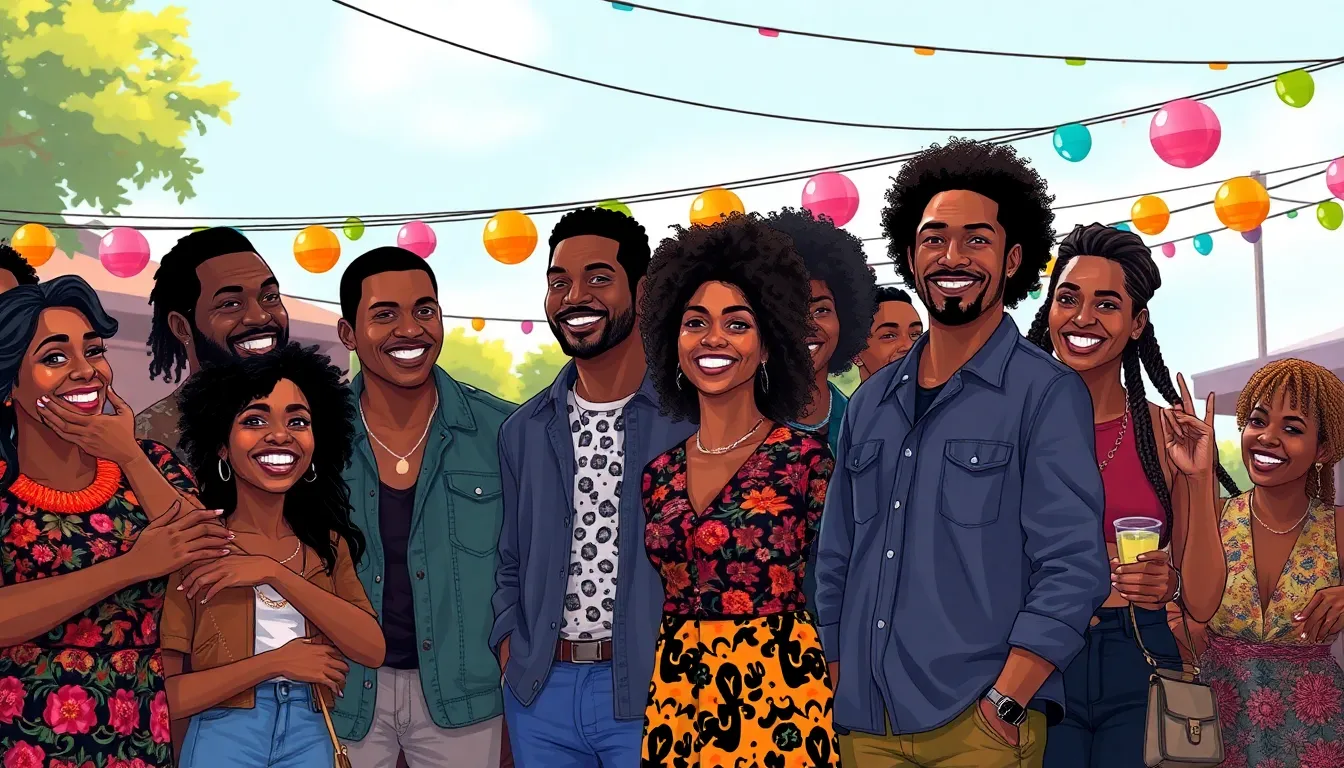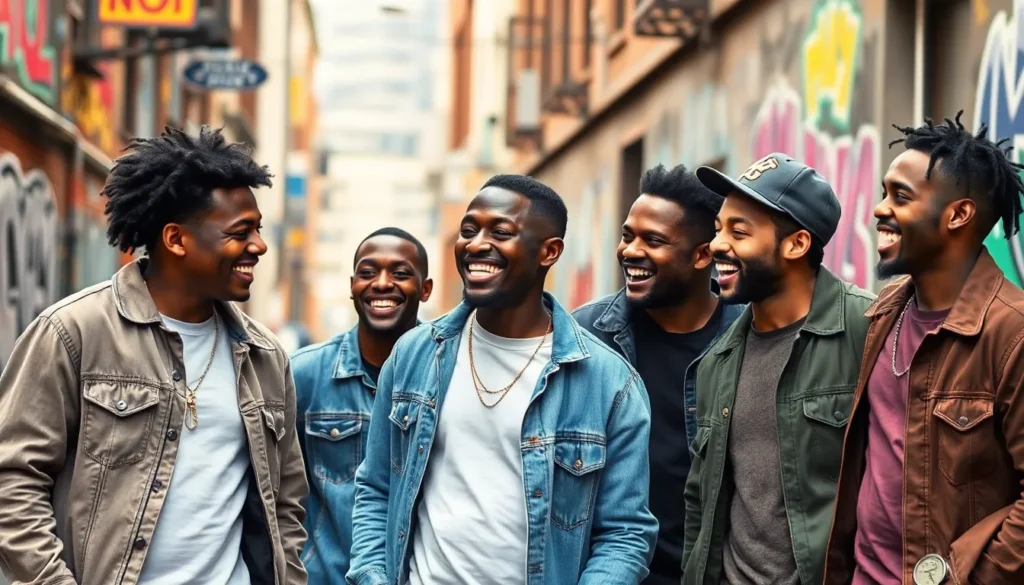The 90s was a golden era for black cinema, bursting with films that not only entertained but also challenged societal norms. From laugh-out-loud comedies to poignant dramas, these movies captured the essence of the African American experience with style and flair. Who could forget the iconic performances that made stars out of everyday folks?
Whether it was the unforgettable antics of “Friday” or the powerful storytelling in “Boyz n the Hood,” these films left an indelible mark on pop culture. They sparked conversations and inspired a generation, all while serving up some serious nostalgia. So grab your popcorn and buckle up as we dive into the unforgettable world of 90s black movies that still resonate today.
90’s Black Movies
The 1990s marked a pivotal era for Black cinema, characterized by a blend of genres that reflected authentic narratives. Comedies like “Friday” offered humor while illuminating everyday struggles, capturing the essence of urban life. Dramas such as “Boyz n the Hood” tackled crucial societal issues, emphasizing the challenges faced within African American communities.
Cult classics emerged, including “New Jack City,” which portrayed the harsh realities of drug culture while featuring a strong ensemble cast. Films like “The Pelican Brief” demonstrated the versatility of Black actors, showcasing talents in mainstream projects.
Additionally, romantic comedies, exemplified by “Love Jones,” highlighted Black love in a relatable manner. Each film contributed to a larger conversation about race, identity, and resilience, resonating with audiences far beyond the 90s.
Cinematography during this period celebrated unique storytelling techniques, enhancing the audience’s connection to the characters’ experiences. Notable directors, including John Singleton and Spike Lee, brought bold visions to life, shaping the landscape of Black representation.
Emerging from this decade, themes of empowerment and community became prevalent. Movies united audiences in discussing shared experiences while challenging stereotypes entrenched in earlier cinematic portrayals. Through laughter and drama, 90s Black movies solidified their place in film history, influencing future generations.
Overall, the impact of this cinematic era continues to inspire filmmakers and entertain audiences worldwide, echoing through today’s narratives.
Cultural Significance

90s Black movies hold immense cultural value, showcasing authentic narratives and diverse experiences. They influenced perceptions of race, identity, and community.
Representation in Media
Representation in media during the 90s marked a transformative era. Mainstream films featured Black actors in leading roles, shifting the portrayal of African Americans from stereotype to substance. Notable films like “Waiting to Exhale” highlighted the complexity of Black women’s lives. Characters became relatable figures, portraying strengths and vulnerabilities. This visibility challenged the systemic marginalization seen in previous decades. Directors and writers embraced their cultural backgrounds, leading to compelling storytelling that resonated with audiences.
Impact on Society
The impact on society extended beyond entertainment. Numerous films sparked conversations about social issues affecting African American communities. “Boyz n the Hood” shed light on gang violence and its consequences, prompting dialogues that questioned societal norms. Comedies like “Friday” offered a humorous take on everyday challenges, allowing audiences to connect through laughter. Prominent themes of empowerment and resilience emerged. These films arguably laid the groundwork for future generations to explore their narratives, inspiring activists and creators alike.
Iconic Films of the 90’s
The 90s brought forth a wealth of films that not only entertained but also resonated deeply with audiences. These movies encompassed various genres, each portraying aspects of the Black experience with authenticity.
Key Genres
Comedy, drama, and romance defined the cinematic landscape of the 90s. Comedies like Friday combined humor with social commentary, resonating with viewers. Dramas, such as Boyz n the Hood, confronted real societal issues, provoking critical discussions. Romantic comedies like Love Jones showcased the dynamics of Black relationships, blending humor with heartfelt storytelling. Action-packed films like New Jack City portrayed gripping narratives around drug culture, illustrating its consequences on communities. The diversity of genres allowed audiences to connect with a range of experiences, highlighting the richness of Black storytelling.
Notable Directors and Actors
Prominent figures like John Singleton and Spike Lee served as visionary directors, significantly impacting Black cinema. Singleton’s work brought profound stories to life, exemplified in Boyz n the Hood. Lee’s films, including Malcolm X, challenged stereotypes while providing powerful social messages. Actors such as Angela Bassett and Laurence Fishburne emerged as leading talents, earning accolades for their contributions. Their performances influenced perceptions of Black characters in cinema, showcasing depth and complexity. Collectively, these directors and actors shaped the narrative landscape, making lasting impressions on audiences and filmmakers alike.
Themes Explored in 90’s Black Movies
90’s black movies dive deep into various themes, reflecting the complexities of the African American experience. This era produced a rich tapestry of narratives that resonated across demographics.
Comedy and Satire
Comedies like “Friday” showcased everyday life, using humor to address serious topics. Characters faced relatable challenges, allowing audiences to find laughter amid struggles. Films cleverly highlighted cultural norms, often satirizing stereotypes that pervaded society. Another example, “The Nutty Professor,” blended absurdity with heart, emphasizing self-acceptance. These comedies provided a means of comfort, inviting audiences to laugh while considering underlying social issues.
Drama and Social Issues
Dramas such as “Boyz n the Hood” portrayed pressing social issues within African American communities. Storylines focused on systemic racism, gang violence, and economic disparities. Insights into the lives of characters fostered empathy and understanding among viewers. “Set It Off” examined themes of friendship and survival amid adversity, showcasing resilience. Each narrative pushed audiences to reflect on societal injustices, sparking necessary dialogues around race and identity.
Lasting Legacy
90s Black movies created a profound impact on the film industry and pop culture. They offered genuine portrayals of the African American experience while challenging societal expectations. With iconic films like “Boyz n the Hood” and “Waiting to Exhale,” audiences engaged in pivotal conversations about race, identity, and community.
Cultural influences from this era resonate in modern media. Filmmakers today draw inspiration from the authenticity and bold storytelling present in these classics. Comedies such as “Friday” not only entertained but also sparked discussions about social issues common in African American communities.
Dramatic narratives highlighted by directors like John Singleton and Spike Lee shifted mainstream perceptions. Their films provided meaningful representations, shaping audience understanding of complex characters and situations. The success of these directors paved the way for diverse storytelling that continues to flourish.
Empowerment emerged as a recurring theme. Films showed resilience in the face of adversity, encouraging future generations to tell their own stories. Iconic performances by actors, including Angela Bassett and Laurence Fishburne, showcased the talent and depth within the community.
Conversations inspired by these movies laid the foundation for ongoing critiques of systemic issues. Those engage with films fostered empathy and understanding, propelling important discussions on race and identity. The lasting legacy of 90s Black cinema continues to shine, enriching contemporary culture and inspiring filmmakers.
Conclusion
The legacy of 90s Black movies remains a powerful force in today’s film landscape. These films not only entertained but also sparked essential conversations about race and identity. The authentic storytelling and diverse narratives paved the way for future creators to explore their own experiences.
As audiences continue to revisit these classics, they find renewed relevance in the themes of empowerment and resilience. The impact of directors and actors from this era resonates deeply, inspiring a new generation to challenge societal norms and share their stories. The cultural significance of 90s Black cinema will always be felt, enriching the tapestry of modern filmmaking.

